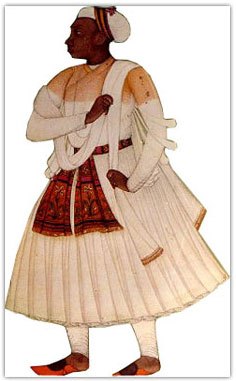|
Malik Ambar was born in 1546 in Ethiopia, where he was subsequently sold to an Arab slave merchant by his parents. He worked for the merchant in Baghdad before he was sold to a merchant in Deccan. He was sold again to a prominent noble at the courts of the Nizam Shahs of Ahmednagar. (Ahmednagar is a city of Ahmednagar District in the state of Maharashtra, India) In 1600 the Mughals overthrew the ruling powers of Ahmendnagar but Amber was able to escape free. He led a small following and took control of the countryside. Jahangir of the Mughals’ forces held siege around the area where Ambar and his following resided. War was declared between Amber and the Mughal’s. As the power of Ambar grew, the power of the Mughals steadily declined. Ambar trained his followers in the art of Guerrilla warfare. Using this strategy he captured the young Scion of the Ahmendnagar dynasty, Mustaza II, grandson of Nizam Shah. He married him to his own daughter, and placed Mustaza II on the throne of Ahmendnagar, naming himself regent of the State. With power in hand Amber launched great architectural projects, constructing or strengthening fortifications at vulnerable spots. He had a Church built for the Christians, raised monuments at Khirki, and gave the town a sophisticated water supply system. Also seven years after appointing Mustaza II to ruler, he disposed of him and became ruler himself. In a long bitter war with the Mughals neither Ambar nor Jahangir could gain the upper hand on each other. Jahangir also used literature as a means to defeat Ambar. In his writing’s he was often found calling Ambar a “black-faced wretch”. One clash between the two forces found Ambar’s force of 10,000 defeating Jahangir’s force of 40,000. He also seized the ships of the Mughals and forced the city of Bijapur to pay him tribute. Golconda, a city whose name was once synonymous all over the world with wealth, also met Ambar’s wrath. In 1628 the English arrived in India with intentions of using the Land as a base for commerce, but Ambar rejected their advance and also rejected their bribery. The English also tried to oust Ambar by conspiracy; he retaliated by seizing one of their caravans worth 200,000 Rupees. The English in turn took one of his ships and demanded their money; Ambar reminded them that they had one of his ships, so there was no deal. Later in 1628, Ambar faced off with Abdullah one of Jahangir’s allies. Armed with cannons, rockets, and Elephants, Ambar defeated Abdullah giving Jahangir a feeling of hopelessness. The tide turned when Ambar died at the age of eighty, giving Jahangir the upper hand in the battle. Despite being placed into slavery as a child Ambar became the first general, politician and financier of his time. Under his rule his country thrived, it was immaculately cultivated and the citizens were very happy. Ambar founded the city of Aurangabad and beautified it with a palace, gardens, and bodies of water lined with stone. Indian Historian Motamid Khan spoke these words about Ambar; “This Ambar was a slave, but an able man. In warfare, in command, in sound judgment, in administration, he had no rival or equal. He well understood that predatory warfare which in the language of the Deccan is called bargi-giru. He kept down the turbulent tribes and maintained his exalted position to the end of his life and closed his career in honor. History records no other instance of an Abyssinian slave at such eminence.” Malik Ambar we stand on your shoulders. J.A. Ward. Click below to view the Malik Ambar video
0 Comments
Leave a Reply. |
Details
Categories
All
Click Here to join our mailing list
|
Contact Us: |
Connect With Us |
Site powered by PIT Web Design


 RSS Feed
RSS Feed



